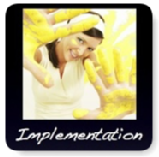All entries for Friday 21 October 2011
October 21, 2011
Marketing and Participatory Design Thinking Practical
Follow-up to Marketing and Participatory Design Thinking from Inspires Learning - Robert O'Toole
Following on from my lecture...
In just 45 minutes, we responded to this creative brief...

With small teams each creating mind maps of their proposed campaigns, and presenting them to the rest of the class (with the maps displayed through the projectors). The maps were created using the Mindjet app on iPads (connected to the screen with a VGA connector). Mindjet is available for free from the Apple App Store for iPhone and for iPad. The Mindjet Mindmanager Windows and Apple desktop software is available for free to all Warwick students and staff.
Some very good initial campaign ideas were presented. It was suggested that they would form the starting point for a participatory design process, bringing in customers/stakeholders to test and develop the ideas further.
Click on each image to see it full size.
The materials that were created for the real Warwick Blogs publicity campaign can be viewed here.
Marketing and Participatory Design Thinking
I taught a session this week as part of the MA in Global Media and Communication (Cultural Policy Studies). It started with a 1 hour long lecture and discussion, followed by a practical session (see the results here).
Here are the slides and videos from the lecture. The mind maps, and links to the software, will be uploaded in a separate entry. Click on the thumbnails to see the full size slide...
The DHL That's Logistics campaign makes people feel part of the logistics operation. Perhaps this will result in greater client-service cooperation, contributing to avoiding problemsor resolving them faster?
We built a prototype timeline of resources and events, to show how the course might achieve these changes, and to ensure that the vision of the teachers and the admin practicalities could work towards these ends. We then filmed a walk through of the timeline, narrated by the students. This could then be shown to other potential students, teacher, funders and managers, for a next iteration of prototype and test. Thinking about marketing was an essential part of this process from the earliest stage.




 Robert O'Toole
Robert O'Toole

 Please wait - comments are loading
Please wait - comments are loading

















